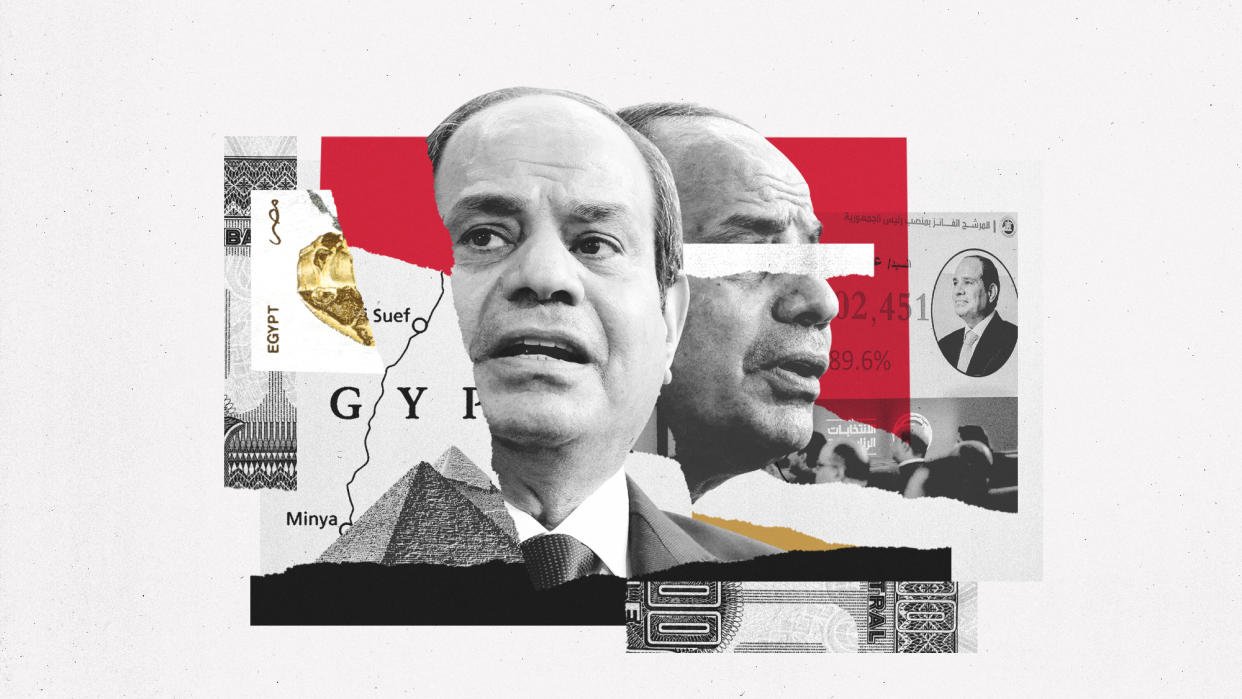What does the future look like for newly reelected Egyptian strongman el-Sisi?

- Oops!Something went wrong.Please try again later.
More than 10 years after rising to power in the wake of Egypt's 2013 coup d'etat, longtime Egyptian strongman leader Abdel Fattah el-Sisi has been elected to a third term as president of the Middle East's most populous Arab nation, that country's National Elections Authority announced on Monday. Calling the election's 66.8% turnout "unprecedented," NEA chair Hazem Badawy formalized el-Sisi's widely expected win, pegging his final victory margin at 89.6% of the more than 39 million ballots cast over three days of voting earlier this month, according to Al Jazeera.
Sisi's victory "came as no surprise given the absence of strong candidates" running against him, CBS News reported, noting that "opposition figures believe there was more to el-Sisi's overwhelming win than just popularity." Sisi's most "prominent" opponent ended his campaign several months ago after alleging "officials and thugs had targeted his supporters," according to Reuters. The NEA's Badawy denied any alleged corruption during his remarks on Monday, insisting there'd been "no violations in the election process."
Now, on the cusp of his third and constitutionally mandated final six-year term in office, Sisi stands poised to lead a very different Egypt than the one he first commanded after ousting then-President Mohamed Morsi more than a decade ago; an ongoing economic crisis has left "Egyptian pound tumbling, foreign currency drying up and inflation soaring," Reuters reported, while Israel's war with Hamas in the Gaza Strip to Egypt's immediate north has raised the prospect of spillover violence, and a humanitarian crisis that could engulf the broader region.
What the commentators said
In the run-up to this month's election, "the economy was all anyone was talking about and people wanted to see change," Egyptian voter Hala Hassan told National Public Radio while waiting to cast her ballot. Since the war with Gaza began, however, she said "all anyone in Egypt talks about is the country's border security." In particular, before Israel had invaded Gaza, Egypt's largely ineffectual political opposition had "built some momentum this year ahead of the election," — a quixotic bid from candidates "who — despite having no real hope of winning — were intended to highlight dissident voices," according to Barrons.
The war in Gaza may have energized Sisi's campaign among voters who "thought the country is facing a dangerous situation," Cairo University political science professor Mustapha Kamel Al-Sayyid explained to CBS. In that context, their calculus was that it's "good to have someone who has the support of the military and the experience of running the country," Al-Sayyid, who cofounded the Egyptian opposition coalition Civil Democratic Movement, added.
If Sisi "ever felt his grip slipping, he simply brazened it out," with "regional crises eroding any pressure on him" to enact broad domestic reforms, The New York Times reported. Western allies often "proved willing to overlook their distaste for his human-rights abuses and silencing of dissent" in exchange for his support for regional stability given Egypt's prime location. Often "geography made the argument for him."
"Sudan, Libya, Syria, Palestine — compared to others, we are doing better," Cairo voter Adel Tawfik told The Washington Post, adding that "we are right in the middle of fire."
What next?
No matter how handily Sisi defeated his opponents this month, he now "faces a host of daunting challenges ahead," according to the Post. The "immediate priority" is balancing his country's peace treaty with Israel and staying out of the Gaza war, while still working to "assuage public anguish over the suffering of Palestinians."
Domestically, Sisi's next term will likely be defined by Egypt's plummeting economy. With the election over, "many Egyptians will once again shift their attention to their harsh everyday reality of grappling with soaring prices, double-digit inflation, and high unemployment," Shahira Amin, senior fellow at the Atlantic Council’s Scowcroft Middle East Security Initiative, predicted.
The growing economic turmoil — including calls from the International Monetary Fund to "sell more state assets and further loosen the reins on the pound" — could ultimately put Sisi in familiar straits for Egyptian leaders, Bloomberg reported, reminding readers that "protesters helped topple his two predecessors, including long-time strongman Hosni Mubarak during the Arab Spring in 2011."

